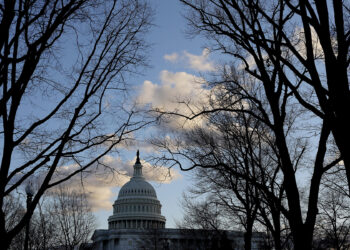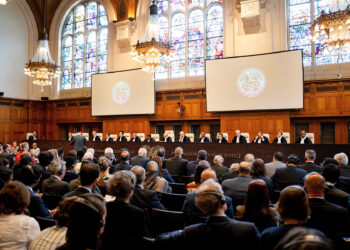Foreign policy reforms require curbing influence of defense industry and foreign governments
(Washington, D.C., November 8, 2023) — U.S. foreign policy rooted in restraint can and should be reformed to fulfill international legal obligations and human rights commitments, concluded participants in a workshop that DAWN organized with Yale Law School on September 29, 2023.
Any positive changes in U.S. foreign policy will require advocacy groups and think tanks to take on efforts to limit the power and influence of the defense industry and foreign governments in Washington, argued DAWN in its policy paper submitted for the conference.
"We set out to have this important discussion about how U.S. policy rooted in restraint can be advanced to meet our country's international obligations to uphold human rights and stop atrocities around the world," said Sarah Leah Whitson, DAWN's Executive Director. "As Israel's war in Gaza amply demonstrates, there can be no reform in U.S. policy until we collectively take on the fight against foreign government influence and defense industry lobbying in Washington."
To examine the merits and limitations of a more restrained U.S. foreign policy, DAWN cohosted an expert workshop with Yale Law School, Bridging Restraint and Positive Engagement: Toward a New Framework for U.S. Middle East Policy, that brought together prominent scholars and policy analysts. Participants debated whether it would be possible to devise a new normative framework that goes beyond the strategy of restraint. Speakers proposed approaches that would ground U.S. policies in respect for human rights and align U.S. interests with more active, engaged policies that contribute to positive, democratic change, while rectifying the harms to which the U.S. has contributed.
Contributors to the workshop included Matthew Duss, Executive Vice President at the Center for International Policy; Stephen Walt, the Robert and Renée Belfer Professor of International Affairs at the Harvard Kennedy School; Michael Wahid Hanna, U.S. Program Director at the International Crisis Group; Iyad el-Baghdadi, writer and President of the Kawaakibi Foundation; Nader Hashemi, Associate Professor at Georgetown University and Director of the Alwaleed Center for Muslim-Christian Understanding; Aslı Bâli, Professor of Law at Yale Law School; Emma Ashford, Senior Fellow at the Stimson Center; and Sarah Leah Whitson, Executive Director of DAWN.
The growing effort to push the U.S. toward a foreign policy of restraint includes a wide array of academics, analysts, human rights advocates and policymakers across the political aisle. There is broad recognition that decades of policies pursued by the U.S. in the Middle East, in many instances motivated by a desire to maintain U.S. primacy, have been counterproductive, undermining not only stability and U.S. strategic interests, but also human rights and democracy in a region that remains overwhelmingly autocratic and militarized. Yet for many, a more restrained U.S. foreign policy in the Middle East is still too limited in scope, failing to articulate a comprehensive and positive vision for engagement that both serves U.S. interests and upholds America's legal and ethical responsibilities to the region.
"Bridging Restraint provided a unique forum for experts to craft an alternative approach to U.S. foreign policy in the Middle East that combines the virtues of restraint with a focus on practical, constructive engagement on democracy, human rights and other issues," said Aslı Bâli, Professor of Law at Yale Law School. "The diverse perspectives of the participants underscore the complexities and ethical quandaries associated with U.S. foreign policy in the region—and the pressing need for a new, multidimensional approach that considers both short-term actions and long-term consequences."
The first workshop session, presented by Stephen Walt, Michael Wahid Hanna and Iyad el-Baghdadi and moderated by Matthew Duss, explored what restraint means in practice for U.S. foreign policy and its perceived limitations, specifically in the case of U.S. Middle East policy. The second session, presented by Aslı Bâli, Emma Ashford and Sarah Leah Whitson and moderated by Nader Hashemi, examined a positive normative strategy for U.S. engagement in the region, seeking out an alternative vision for U.S. foreign policy that bridges the merits of restraint and the gaps it leaves in responsibility and accountability for the MENA region.
To spur further debate on these important questions of U.S. foreign policy, DAWN will publish a selection of articles adapted from papers presented at the workshop in its online journal, Democracy in Exile. A report detailing the proceedings of the Bridging Restraint workshop is available here.
"A more restrained foreign policy remains the best way to preserve U.S. security and prosperity, and it may also be the best way to advance the core values that realists and progressives share," argues political scientist Stephen Walt, the Robert and Renée Belfer Professor of International Affairs at the Harvard Kennedy School, in the first of two articles published in Democracy in Exile in this series.
"A strategy of restraint has failed to take hold of U.S. foreign policy in the Middle East despite the stated aims, in varying degrees, of three consecutive presidents," writes Emma Ashford, a Senior Fellow with the Reimagining U.S. Grand Strategy program at the Stimson Center. "Each administration allowed path dependence and inertia to overwhelm attempts to adequately assess U.S. interests in the region today, and each one demonstrated a profound inability to accept that there are limits to the U.S. ability to shape the region and its states."
Aslı Bâli presented a vision for how U.S. policy could be reformed to address the country's international legal and moral obligations. "Desisting in activities that harm human rights is the number one way that the U.S. can positively contribute to the protection of human rights," she argued. "It's hard to overstate the damage of U.S. strategy today." Whitson addressed the obstacles to any foreign policy reforms in Washington and DAWN's proposals to limit the power and influence of foreign governments and the defense industry.
Bridging Restraint and Positive Engagement: Toward a New Framework for U.S. Middle East Policy is the latest foreign policy workshop convened by DAWN. In 2022, DAWN and the Schell Center for International Human Rights at Yale Law School co-sponsored Human Rights Go to War, an expert workshop focused on how human rights groups and advocacy organizations engage in policy debate and legal discourse pertaining to international humanitarian law and whether alternative approaches could better protect and promote human rights before armed conflicts break out.
In 2021, DAWN and the Center for International Studies at the Massachusetts Institute of Technology co-sponsored Aid Conditionality, a workshop that examined the principles, effectiveness and possible harms of conditioning U.S. arms transfers and economic and diplomatic support to abusive governments in the MENA region based on improvements in their human rights record.
Earlier this year, in January 2023, DAWN co-hosted a conference with the Tawakkol Karman Foundation and the Center for Contemporary Arab Studies at Georgetown University on how to build sustainable peace and democracy in Yemen. In April 2023, DAWN and the Uyghur Human Rights Project co-hosted an expert workshop on the complicity of authoritarian governments in the Middle East with China's repression of minority Uyghur Muslims.
Articles adapted from all these workshops and conferences are available in DAWN's journal, Democracy in Exile.







